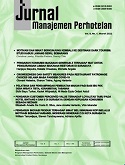PENGARUH KONSUMSI MAKANAN GENERASI Z TERHADAP NIAT UNTUK PENGURANGAN LIMBAH MAKANAN RESTORAN DI SURABAYA
 :
:
https://doi.org/10.9744/jmp.8.1.14-25
Keywords:
food consumption, generation z, theory of planned behavior, food waste reduction intentionAbstract
The purpose of this research is to analyze the influence of generation Z food consumption towards food waste reduction intention in restaurants in Surabaya with attitude, subjective norms and perceived behavioral control as the mediating variables. This research was conducted by distributing questionnaires to 241 respondents, then analyzed using descriptive statistical analysis techniques with Partial Least Square (PLS) software. The result showed a positive, but insignificant relationship between generation Z food consumption and food waste reduction intention. Attitude and subjective norms were not proven to have mediating effect between the two variables, whereas perceived behavioral control were proven to have mediating effect.
Abstrak
Penelitian ini bertujuan untuk menganalisis pengaruh konsumsi makanan generasi Z terhadap food waste reduction intention dalam restoran di Surabaya dengan variabel mediasi attitude, subjective norms, dan perceived behavioral control. Penelitian ini dilakukan dengan menyebarkan kuesioner kepada 241 responden dan dianalisis menggunakan teknik analisa statistik deskriptif dengan menggunakan software Partial Least Square (PLS) dalam proses pengolahan datanya. Hasil yang diperoleh dalam penelitian ini menunjukkan adanya hubungan yang positif tetapi tidak signifikan antara food consumption generasi Z terhadap food waste reduction intention. Kemudian attitude serta subjective norms tidak terbukti sebagai variabel yang memediasi hubungan antara food consumption generasi Z terhadap food waste reduction intention, sedangkan perceived behavioral control terbukti sebagai variabel yang memediasi hubungan antara food consumption generasi Z terhadap food waste reduction intention.
References
Abdillah, W., & Jogiyanto. (2015). Partial Least Square (PLS) : Alternatif Structural Equation Modeling (SEM) dalam penelitian bisnis.
Ajzen, I. (1991). The Theory of Planned Behavior. Organizational Behavior and Human Decision Processes, 50, 179-211.
Aktas, E., Sahin, H., Topaloglu, Z., Oledinma, A., Huda, A. K., Irani, Z., Kamrava, M. (2018). A consumer behavioural approach to food waste. Journal of Enterprise Information Management, 31(5), 658-673.
Bencsik, A., Juhász, T., & Horváth-Csikós, G. (2016). Y and Z generations at workplaces. Journal of Competitiveness, 6(3), 90-106.
Buzby, J. C., & ea, H. F. (2014). The estimated amount, value, and calories of postharvest food losses at the retail and consumer levels in the United States. USDA ERS. https://www.ers .usda.gov/publications/pub-details/?pubid=43836.
Coşkun, A., & Yetkin Özbük, R. M. (2020). What influences consumer food waste behavior in restaurants? an application of the extended theory of planned behavior. Waste Management, 117, 170–178.
Donny. (2021). Jumlah sampah makanan harian di beberapa kota di Indonesia. https://travelingper-second.com/2021/05/25/9-gagasan-mengurangi-sampah-makanankota/
Elshaer, I., Sobaih, A. E., Alyahya, M., & Abu Elnasr, A. (2021). The impact of religiosity and food consumption culture on food waste intention in Saudi Arabia. Sustainability, 13(11), 6473.
FAO. (2011). Food loss and food waste. Food and Agriculture Organization of the United Nations. http://www.fao.org/food-loss-and-food-waste/flw-data
FAO. (2013). Food wastage footprint: Impacts on natural resources-fao.org. Food wastage footprint: Impacts on natural resources. Retrieved March 16, 2022, from https://www.fao.org/publications/ card/en/c/000d4a32-7304-5785-a2f1-f64c6de8e 7a2
Fornell, C., & Larcker, D. F. (1981). Evaluating structural equations models with unobservable variables and measurement error. Journal of Marketing Research, 18(1), 39-50.
Ghozali. (2014). Aplikasi analisis Multivariate dengan Program SPSS.
Gunders, D. (2012). Wasted: How America is losing up to 40 percent of its food from farm to fork to landfill, https://www.nrdc.org/sites/default/files/ wasted-food-IP.pdf.
Graham-Rowe, E., Jessop, D. C., & Sparks, P. (2015). Predicting household food waste reduction using an extended theory of planned behaviour. Resources, Conservation and Recycling, 101, 194– 202.
Hendayana, Y. (2020). Grobak, kreativitas mahasiswa ITS dalam tuntaskan food waste di Indonesia. Direktorat Jenderal Pendidikan Tinggi Kemente-rian Pendidikan dan Kebudayaan Republik Indonesia. https://dikti.kemdikbud.go.id/kabar-dikti/kampus-kita/grobak-kreativitasmahasiswa-its-dalam-tuntaskan-food-waste-di-indonesia/.
Irwanto, I., & Hariatiningsih, L. R. (2019). Aktivitas santap dan minum generasi Z pada media sosial instagram. Mediator: Jurnal Komunikasi, 12(2). https://doi.org/10.29313/mediator.v12i2.5048
Jogiyanto. (2008). Teori portofolio dan analisis inves-tasi. Edisi Kelima, BPFE. Yogyakarta.
Khadka, S. (2017). Reducing food waste vital for India's food security. Down to earth.
https://www.downtoearth.org.in/blog/food/reducing-food-waste-vital-for-india-s-foodsecurity-57345.
Kymäläinen, T., Seisto, A., & Malila, R. (2021). Gene-ration Z food waste, diet and consumption habits: A finish social design study with future consumers. Sustainability, 13(4), 2124.
Radzymińska, M., Jakubowska, D., & Staniewska, K. (2016). Consumer attitude and behaviour towards food waste. Journal of Agribusiness and Rural Development, 10(1).
Russell, S. V., Young, C. W., Unsworth, K. L., & Robinson, C. (2017). Bringing habits and emotions into food waste behaviour. Resources, Conservation and Recycling, 125, 107–114.
Sakaguchi, L., Pak, N., & Potts, M. D. (2018). Tackling the issue of food waste in restaurants: Options for measurement method, reduction and behavioral change. Journal of Cleaner Production, 180, 430–436.
Wajon, E., & Richter, J. (2019). Students’ intention to reduce food waste an approach with an extended version of the theory of planned behavior. (Thesis, Uppsala University).


















